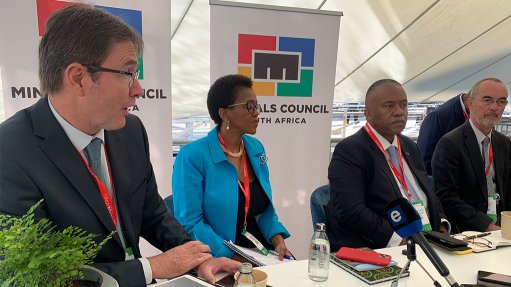
Minerals Council South Africa CEO Roger Baxter, Council president Nolitha Fakude, office bearer Themba Mkhwanazi, and chief economist Henk Langenhoven.
Photo by: Creamer Media
CAPE TOWN (miningweekly.com) – Minerals Council South Africa CEO Roger Baxter said on Monday that the council is encouraged by the board level engagement it has undertaken so far with State rail enterprise Transnet and is hoping that this engagement will deliver some very specific results in stabilising rail performance in the short term.
Baxter said this in delivering the Mineral Council’s yearly State of the Mining Nation report, together with Minerals Council South Africa president Nolitha Fakude, Minerals Council South Africa chief economist Henk Langenhoven, and Minerals Council South Africa office bearer Themba Mkhwanazi, to the media at an event in which Mining Weekly took part.
“We’ve got four channel optimisation teams that are working on short-term solutions on the Transnet side and we are encouraged by the progress being made in these discussions so far.
“We’ve focused on recovery in the short term and then getting back on to a growth track,” Baxter said during the media briefing.
In this regard, Baxter made mention of the large junior and emerging miner membership of the Minerals Council and emphasised the work being done with the council’s junior and emerging miner membership, served by a dedicated team.
“We’ve had that in place for the last five years but we’re also looking at additional measures we can take to enable juniors and emerging miners to participate in exports over time.
“It is part of our process to ensure that our members are accommodated because we do represent the junior and emerging mining sectors.
“Often people have the view that we only represent the large-scale majors. We have more than 250 mining companies that are members of the Minerals Council and a significant percentage of those are junior and emerging mining entities and we are addressing their particular issues as we go forward,” Baxter said.
On the Eskom side, setting up of workshops has taken place involving the Presidency, the Minerals Council, the Electricity Intensive Users Group and the Ferroalloy Producers Association.
“We engaged on the basis of how we could unlock greater private sector investment in self-generation.
“We seconded three people into the Presidency to help with the process and it resulted in reforms that we think are going to help us really solve the electricity crisis more in the medium term.
“In the short term, we’re still at stage 3 loadshedding and a bit later we’ll go up to stage 4 loadshedding, which does affect us,” said Baxter.
SIGNIFICANT MINING CONTRIBUTION
The South African mining industry’s contribution to South Africa’s gross domestic product in 2022 was R494-billion, Minerals Council state in its 'Facts & Figures Pocketbook 2022' just released.
Value of total production was a high R1.18-trillion in 2022 but red lights are flashing in that South African mining industry could have done a lot better.
Exceeding the trillion rand mark for the second year was driven mostly by strong commodity prices but the production side dropped to a level that did not even return output to the pre-Covid level, which is concerning.
Production has had to respond to the various constraints that we’re facing but the revenue effect from higher prices has been quite nice.
“We’ve had extra jobs. Just remember, if you are sitting at 475 000 jobs, we have a multiplier of ten to one, which means that there are ten people dependent on the mining sector, and we have what it is called a three-to-one multiplier, so we estimate that about 1.3-million people are employed in the economy as a result of the mining sector.
“Whilst we’ve done very well on the financial side in terms of our export earnings base and our sales value base, we are concerned about various constraints that are affecting us,” said Baxter.
Stage 6 loadshedding results in demand curtailment at the Eskom level and the industry remains very dependent on Eskom.
Worsening rail and logistical constraints have had a material impact on mining’s export capacity.
Still, mining has continued to be a significant contributor to the fiscus, with R74-billion paid in corporate taxes, R14-billion in royalties and R27.1-billion in Pay As You Earn taxes by employees.
Although mining’s contribution to gross domestic product (GDP) is 8%, if you add in the multipliers, mining’s overall contribution to GDP is probably closer to 20% and at the investment level, mining accounts for about 20% of all private sector investment in the economy, which though not insignificant, is not where it could be because of energy, rail and crime constraints.
These constraints have put a worrying brake on investment.
“It's quite difficult to justify investing in a project if you have various constraints that affect your ability to execute that particular project,” said Baxter, with page 29 of the 'Facts & Figures Pocketbook 2022' showing a hugely concerning collapse in net fixed investment, which must be reversed urgently if mines are going to keep giving.
SOUTHERN AFRICA MINING
The Mining Industry’s Association of Southern Africa met on Thursday and Friday, involving all the CEOs of the various minerals councils and the chambers of the region getting together.
On Sunday, a very busy African Mining Ministerial, is said to have been very well attended with some good outcomes.
“The one overarching theme that I’d like to make for everyone here today is that the one adage that we’ve adopted as the Minerals Council is that the council should be the change that it wants to see in the world.
“We don’t spend all our time whinging about issues. We spend our time focused on constructive solutions and adding in capacity and capability sothat things are resolved in the sector, be it in government, logistics, energy; this is one sector that is standing up and being counted in every single sphere that it is dealing with, including on red tape and mining cadastral systems,” said Baxter.